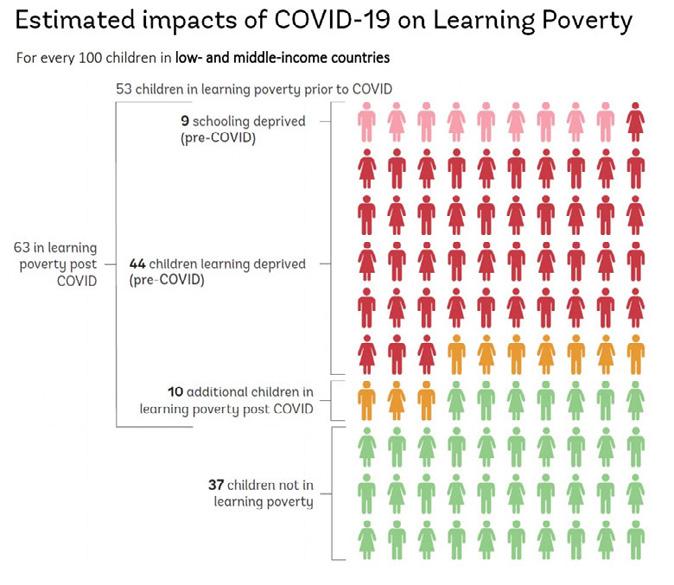
5 minute read
Will the legacy of COVID be an economically more unequal world? Rachel Large
Will the legacy of COVID be an economically more unequal world?
Rachel Large Upper Sixth
capita incomes are increased and the inhabitants of a country benefit from improved living standards, relies partly on education levels of a population, as seen in the country’s Human Development Index, a measure of development.
Unequal scenes - Brazil The Learning Poverty rate (those unable to read and understand a simple text by age 10) in low- and middleincome countries was 53% before the pandemic, but rose to 63% post-COVID (Idrogo, 2021). Lower education levels disadvantage this population in the long run, as their skills and employment opportunities decrease, shown by a fall in the long run aggregate supply.
The COVID-19 pandemic has caused the greatest global economic recession since WW2. The UK was one of the economies that suffered the most from the pandemic, and its recovery may suggest that economies around the world have emerged more unequal.
possibly made redundant. This not only meant some small firms went out of However, COVID-19’s legacy depends business, but also mass unemployment. on the actions of global governments. The UK’s unemployment rate rose from Wealthy nations can provide aid in 4.1% (June 2020), to 5.1% (December monetary or vaccination form to 2020) (Trading Economics, 2021). Loss developing countries to facilitate their of a stable income put further strain on recovery, and likewise provide fiscal low-income families, who may have had support in their domestic economy Inequality is the difference in how wealth, to use their savings to afford necessities. (Romei, 2020). For example, the UK assets or income are distributed among a Relative poverty may occur here (poverty government administered the Furlough population. A reason for this inequality is measured in comparison with other scheme, which aimed to prevent the shut-down of business sectors, mainly people in a country). This widening gap in unemployment by paying 80% of the retail and hospitality. The lockdowns in income and living standards exacerbates worker’s usual wage. As of May 2021, the UK meant these firms were forced to inequality within a country. it has cost the government around £64 close, and could billion (Clark, 2021). The scheme meant not do business The pandemic not only that most UK workers maintained a online, like most amplified inequality steady income, which should prevent the other sectors. within one country, but income inequality gap from widening. also globally. Technology Relative inequality is at the core of the issue Nevertheless, this response could can also be here, as it was essential worsen global inequalities between observed between for the operation of firms wealthy nations and those without this the population. Those in high-skilled and schools. Without technology or governmental support. Thus, many jobs who have flexibility in their working internet access, business would cease to households in emerging and low-income conditions benefitted from the pandemic function. The Internet penetration rate economies lacked a sustained income, environment. Working from home in developed countries is 87%, 47% in which leads to a decrease in consumption meant less costs of travel and overall developing countries and only 19% in the and a contraction in the economy. expenditure, while still maintaining a least developed countries (Roese, 2021), stable income. Here, disposable income meaning wealthy economies who can The short run impacts of the UK’s scheme and savings rose, increasing welfare and invest into technology will thrive, while are positive for the economy and suggests living standards. developing economies fall that COVID-19 behind, as they lack the may not leave as In contrast, the low-skilled, self- funds or infrastructure much inequality employed, and young workers did not to accommodate this as people thought. share these same benefits. The low- technology. The UK’s peak skilled, who generally occupy service unemployment sector jobs especially in retail and As well as hindering rates during hospitality, were likely to be forced online business, it means COVID-19 and to stop work for the duration of the young people cannot access education. the 2008 Financial Crisis were 5.1% and lockdowns (Blundell, 2020), with some Economic development, when real per 8.5% respectively (Trading Economics,
The regressive nature of indirect taxes is likely to worsen inequality. Without technology or internet access, business would cease to function.
India’s oxygen shortages

2021), which is a success, considering the significantly greater fall in GDP experienced by the UK during COVID.
The result of government support in the long run is huge increase in National debt (the total amount of money owed by the government). The UK government’s debt to GDP was 97.4% in 2020-21 (Trading economics, 2020), decreasing the budget deficit to -14.3% of GDP (Trading Economics, 2020). While government spending helps boost the economy in the short run, there may be tax increases in the future as the government moves towards austerity. This includes rises in VAT rates back to 20% and corporation tax to 25% in 2023 (Kuenssburg, 2021). The regressive nature of indirect taxes is likely to worsen inequality as the burden falls on low-income households, who were also those who were disproportionately affected by COVID.
The repercussions of the 2008 Financial Crisis show a decrease in global inequality given that the crisis “was much stronger in the rich countries than in the “emerging” Asia” (Milanovic, 2020). Unlike COVID, the crisis mainly affected the rich of the population, thus reducing the gap of inequality in these areas. This is also shown on a global level, as the richer countries fell into deeper recessions than developing countries. However this cannot be used to forecast the impacts of COVID, because of the disproportionate burden on the lowincomed. Perhaps the most important factor is healthcare stystems. COVID affects health conditions, and therefore people’s ability to work. Rich nations with good healthcare systems were able to accommodate the ill and ensure their recovery, but countries who lacked this were more likely to experience more COVID related deaths, causing loss of human capital and long term productive potential in the economy.
In conclusion, there is no doubt that COVID has exacerbated inequalities internationally, allowing the rich nations and individuals to get richer, while leaving the poor to become poorer. Despite government efforts to combat these inequalities, it is certain that COVID has already brought about a world more unequal, and may continue to in the future.











